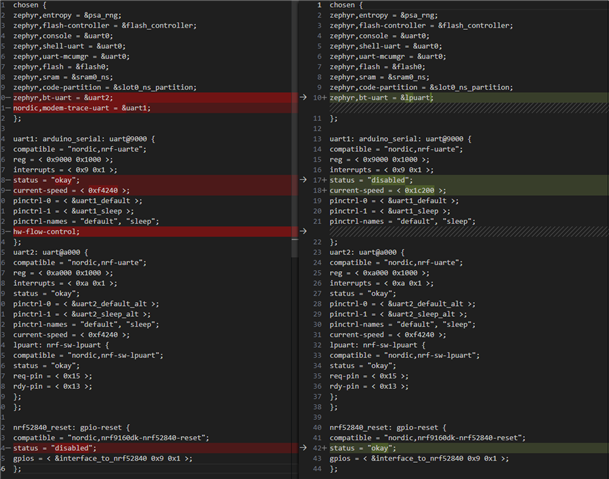Our application on a nRF9160 to act as intermediary between an AWS cloud and another nRF devicee over bluetooth. So I attempted to merge the bluetooth IOT sample with the bluetooth portion lte_ble_gateway sample
When I tried running this I got this crash in the early portion of the bluetooth intialization, before any IOT code is running.
[00:00:00.251,251] <inf> health_hub: The AWS IoT sample started, version: v1.0.0
[00:00:00.251,281] <inf> hp_ble: Initializing Bluetooth..
ASSERTION FAIL [err == 0] @ WEST_TOPDIR/zephyr/subsys/bluetooth/host/hci_core.c:338
command opcode 0x0c03 timeout with err -11
[00:00:10.251,617] <err> os: r0/a1: 0x00000003 r1/a2: 0x00000000 r2/a3: 0x00000002
[00:00:10.251,647] <err> os: r3/a4: 0x20011498 r12/ip: 0x00000010 r14/lr: 0x00020a35
[00:00:10.251,647] <err> os: xpsr: 0x41000000
[00:00:10.251,678] <err> os: Faulting instruction address (r15/pc): 0x00020a40
[00:00:10.251,708] <err> os: >>> ZEPHYR FATAL ERROR 3: Kernel oops on CPU 0
[00:00:10.251,739] <err> os: Current thread: 0x20014010 (unknown)
*** Booting nRF Connect SDK v2.5.1 ***Resetting system
Here is the prj.conf in case this is a missing configuration problem or something
#
# Copyright (c) 2020 Nordic Semiconductor ASA
#
# SPDX-License-Identifier: LicenseRef-Nordic-5-Clause
#
#CONFIG_DEBUG=y
# General
CONFIG_LOG=y
CONFIG_LOG_BUFFER_SIZE=2048
CONFIG_HW_ID_LIBRARY=y
CONFIG_ASSERT=y
CONFIG_JSON_LIBRARY=y
# Heap and stacks
#CONFIG_HEAP_MEM_POOL_SIZE=8192
#CONFIG_MAIN_STACK_SIZE=4096
#CONFIG_SYSTEM_WORKQUEUE_STACK_SIZE=2048
#CONFIG_BOOTLOADER_MCUBOOT=y
# Network
CONFIG_NETWORKING=y
CONFIG_NET_NATIVE=y
CONFIG_NET_IPV4=y
CONFIG_NET_CONNECTION_MANAGER=y
# AWS IoT library
CONFIG_AWS_IOT=y
CONFIG_AWS_IOT_CLIENT_ID_STATIC="my-thing"
CONFIG_AWS_IOT_BROKER_HOST_NAME="xxx.amazonaws.com"
CONFIG_AWS_IOT_SEC_TAG=201
CONFIG_AWS_IOT_APP_SUBSCRIPTION_LIST_COUNT=2
CONFIG_AWS_IOT_TOPIC_UPDATE_DELTA_SUBSCRIBE=y
CONFIG_AWS_IOT_TOPIC_GET_ACCEPTED_SUBSCRIBE=y
CONFIG_AWS_IOT_TOPIC_GET_REJECTED_SUBSCRIBE=y
CONFIG_AWS_IOT_LAST_WILL=y
# MQTT - Maximum MQTT keepalive timeout specified by AWS IoT Core
CONFIG_MQTT_KEEPALIVE=1200
CONFIG_MQTT_CLEAN_SESSION=y
# Console for user association
CONFIG_CONSOLE_SUBSYS=y
CONFIG_CONSOLE_GETCHAR=y
# Enable Bluetooth stack and libraries
CONFIG_BT=y
CONFIG_BT_H4=y
CONFIG_BT_WAIT_NOP=y
CONFIG_BT_CENTRAL=y
CONFIG_BT_GATT_CLIENT=y
CONFIG_BT_GATT_DM=y
CONFIG_BT_SCAN=y
CONFIG_BT_SCAN_FILTER_ENABLE=y
CONFIG_BT_SCAN_UUID_CNT=1
CONFIG_UART_INTERRUPT_DRIVEN=y
# Heap and stacks
CONFIG_HEAP_MEM_POOL_SIZE=16384
CONFIG_MAIN_STACK_SIZE=8192
CONFIG_SYSTEM_WORKQUEUE_STACK_SIZE=4096
# Update Data Length and MTU (BT_L2CAP_RX_MTU = CONFIG_BT_BUF_ACL_RX_SIZE - BT_L2CAP_HDR_SIZE)
CONFIG_BT_USER_DATA_LEN_UPDATE=y
CONFIG_BT_CTLR_DATA_LENGTH_MAX=251
CONFIG_BT_BUF_ACL_RX_SIZE=251
CONFIG_BT_BUF_ACL_TX_SIZE=251
CONFIG_BT_L2CAP_TX_MTU=247
#================================================
# Little FS
#
# Optionally force the file system to be recreated
# CONFIG_APP_WIPE_STORAGE=y
# Let __ASSERT do its job
CONFIG_DEBUG=n
#CONFIG_FLASH=n
#CONFIG_FLASH_MAP=n
#CONFIG_FLASH_PAGE_LAYOUT=n
CONFIG_FILE_SYSTEM=y
CONFIG_FILE_SYSTEM_LITTLEFS=y
# CONFIG_PM_PARTITION_REGION_LITTLEFS_EXTERNAL=y
CONFIG_NVS=y
CONFIG_SETTINGS=y



